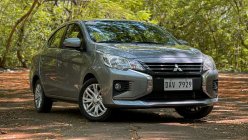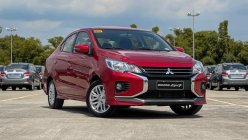In this article...
- Mitsubishi Mirage G4 GLS 2013: A pleasant surprise to drive
- 1. Mitsubishi Mirage G4 GLS 2013 Review: Exterior styling & features
- 2. Mitsubishi Mirage G4 GLS 2013 Review: Interior layout & Amenities
Mitsubishi Mirage G4 GLS 2013: A pleasant surprise to drive
So the hatchback was initially high on our list over the sedan in terms of aesthetics. But as soon as we inspected the interior on both models, things suddenly shifted in the G4’s favor.
Viewed from outside, the Mirage G4 is deceptively small, yet the interior is cavernous for its size. Although the sedan was presumably engineered on the same platform as the hatchback, the former still has the benefit of longer dimensions. That was pretty much evident in the cabin, with the Mirage G4 having significantly more legroom in the rear seating area; Mitsubishi didn’t have to scrimp on space since there was a dedicated area for cargo, unlike on the hatchback.
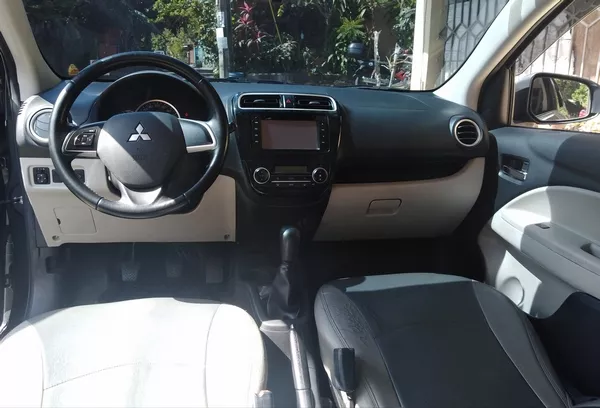
The Mirage G4's cockpit
This resulted in rear seats that are more contoured for better comfort, in contrast with the more bench-like setup on the hatchback. Even better, the Mitsubishi Mirage G4 GLS 2013 has three 3-pt. seatbelts at the rear, although the middle part feels a bit narrower and stiffer compared to the side seats. In the absence of a third passenger, the middle panel can fold down to reveal two hidden cupholders, complementing the other two under the dashboard and another one behind the handbrake. For families with small children, ISOFIX anchors placed near the rear glass let you use child car seats safely and securely.
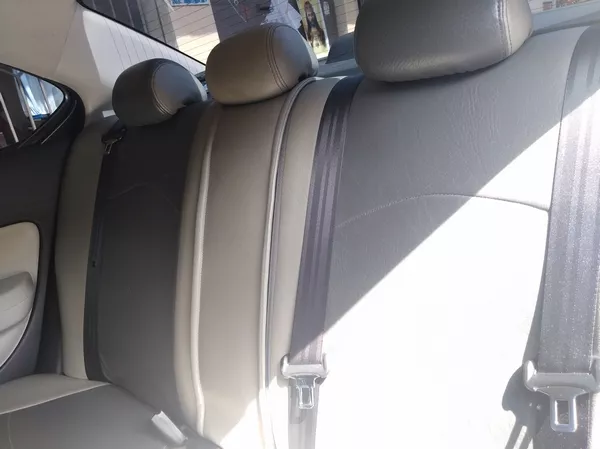
The rear seat has seatbelts for three occupants
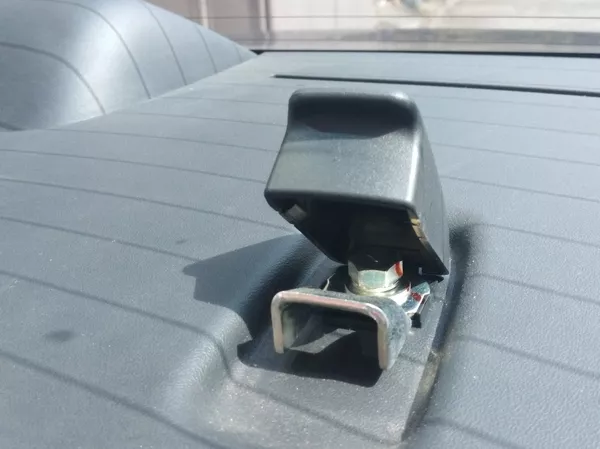
ISOFix anchors (also known as LATCH) to fasten child seats securely
Front space on both models were identical, with somewhat narrow driver and front passenger seats that both have adequate legroom and adjustable forward and backward. Although the driver’s seat has a manual height adjustment via a knob on the left side, even the highest setting still feels negligible. Nevertheless, it’s not that much of an issue since the front seats have a high hip point. Combined with the Mirage G4’s low beltline, this affords front occupants with a better view of the road ahead.
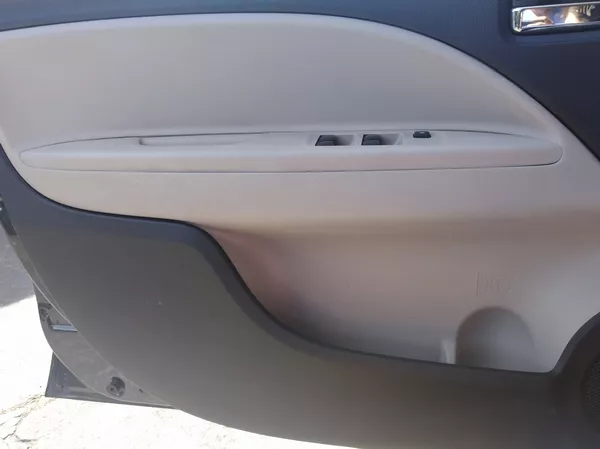
Side pockets inside the front door panels
The front doors have integrated pockets for small items, and they even have holders for bottled beverages, in addition to the twin cupholders on the center console. The rear doors don’t have this feature, which means that aftermarket seat covers with pockets (or seatback pocket organizers) are a must for passengers at the back. All door panels have textured plastic surfaces with no cloth inserts, making them easier to wipe clean.
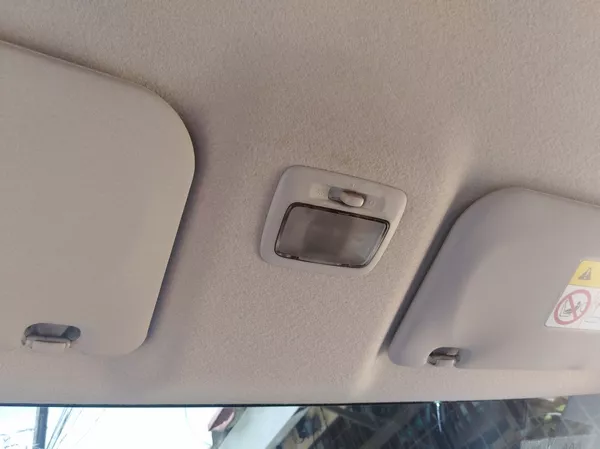
Cabin light mounted near the front of the ceiling
A single cabin light located near the rear-view mirror provides the illumination for the interior, although the rear seat area doesn’t benefit from it as much as the front. It would have been better if the cabin light had a more central location.
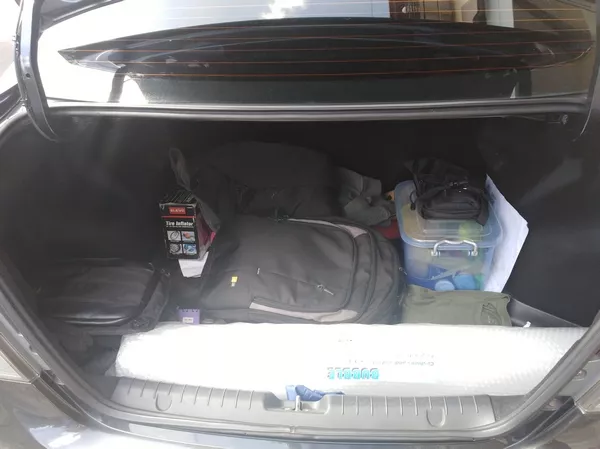
The G4 actually has a larger trunk than the Lancer
The Mitsubishi Mirage G4 2013 trunk is even more noteworthy; at 450 liters, it’s actually more spacious than the rear compartment of the G4’s larger Lancer stablemate, so much so that I could fit a folded full-size wheelchair inside and still be able to close the trunk lid shut. Too bad the rear seats are not collapsible, which would have expanded cargo capacity significantly. Nevertheless, the cavernous trunk still makes the Mirage G4 a good family car.
Through this post, Philkotse.com has given a fair review of the Mitsubishi Mirage G4 GLS 2013 in terms of its exterior styling and interior layout. To gain a more comprehensive insight into this subcompact sedan, click here to read the second part, reviewing its Controls & Performance. The last part coming up next will reveal most common issues that drivers will probably encounter during their ownership. Stay tuned!
1. Mitsubishi Mirage G4 GLS 2013 Review: Exterior styling & features
So the hatchback was initially high on our list over the sedan in terms of aesthetics. But as soon as we inspected the interior on both models, things suddenly shifted in the G4’s favor.
Viewed from outside, the Mirage G4 is deceptively small, yet the interior is cavernous for its size. Although the sedan was presumably engineered on the same platform as the hatchback, the former still has the benefit of longer dimensions. That was pretty much evident in the cabin, with the Mirage G4 having significantly more legroom in the rear seating area; Mitsubishi didn’t have to scrimp on space since there was a dedicated area for cargo, unlike on the hatchback.

The Mirage G4's cockpit
This resulted in rear seats that are more contoured for better comfort, in contrast with the more bench-like setup on the hatchback. Even better, the Mitsubishi Mirage G4 GLS 2013 has three 3-pt. seatbelts at the rear, although the middle part feels a bit narrower and stiffer compared to the side seats. In the absence of a third passenger, the middle panel can fold down to reveal two hidden cupholders, complementing the other two under the dashboard and another one behind the handbrake. For families with small children, ISOFIX anchors placed near the rear glass let you use child car seats safely and securely.

The rear seat has seatbelts for three occupants

ISOFix anchors (also known as LATCH) to fasten child seats securely
Front space on both models were identical, with somewhat narrow driver and front passenger seats that both have adequate legroom and adjustable forward and backward. Although the driver’s seat has a manual height adjustment via a knob on the left side, even the highest setting still feels negligible. Nevertheless, it’s not that much of an issue since the front seats have a high hip point. Combined with the Mirage G4’s low beltline, this affords front occupants with a better view of the road ahead.

Side pockets inside the front door panels
The front doors have integrated pockets for small items, and they even have holders for bottled beverages, in addition to the twin cupholders on the center console. The rear doors don’t have this feature, which means that aftermarket seat covers with pockets (or seatback pocket organizers) are a must for passengers at the back. All door panels have textured plastic surfaces with no cloth inserts, making them easier to wipe clean.

Cabin light mounted near the front of the ceiling
A single cabin light located near the rear-view mirror provides the illumination for the interior, although the rear seat area doesn’t benefit from it as much as the front. It would have been better if the cabin light had a more central location.

The G4 actually has a larger trunk than the Lancer
The Mitsubishi Mirage G4 2013 trunk is even more noteworthy; at 450 liters, it’s actually more spacious than the rear compartment of the G4’s larger Lancer stablemate, so much so that I could fit a folded full-size wheelchair inside and still be able to close the trunk lid shut. Too bad the rear seats are not collapsible, which would have expanded cargo capacity significantly. Nevertheless, the cavernous trunk still makes the Mirage G4 a good family car.
Through this post, Philkotse.com has given a fair review of the Mitsubishi Mirage G4 GLS 2013 in terms of its exterior styling and interior layout. To gain a more comprehensive insight into this subcompact sedan, click here to read the second part, reviewing its Controls & Performance. The last part coming up next will reveal most common issues that drivers will probably encounter during their ownership. Stay tuned!
2. Mitsubishi Mirage G4 GLS 2013 Review: Interior layout & Amenities
So the hatchback was initially high on our list over the sedan in terms of aesthetics. But as soon as we inspected the interior on both models, things suddenly shifted in the G4’s favor.
Viewed from outside, the Mirage G4 is deceptively small, yet the interior is cavernous for its size. Although the sedan was presumably engineered on the same platform as the hatchback, the former still has the benefit of longer dimensions. That was pretty much evident in the cabin, with the Mirage G4 having significantly more legroom in the rear seating area; Mitsubishi didn’t have to scrimp on space since there was a dedicated area for cargo, unlike on the hatchback.

The Mirage G4's cockpit
This resulted in rear seats that are more contoured for better comfort, in contrast with the more bench-like setup on the hatchback. Even better, the Mitsubishi Mirage G4 GLS 2013 has three 3-pt. seatbelts at the rear, although the middle part feels a bit narrower and stiffer compared to the side seats. In the absence of a third passenger, the middle panel can fold down to reveal two hidden cupholders, complementing the other two under the dashboard and another one behind the handbrake. For families with small children, ISOFIX anchors placed near the rear glass let you use child car seats safely and securely.

The rear seat has seatbelts for three occupants

ISOFix anchors (also known as LATCH) to fasten child seats securely
Front space on both models were identical, with somewhat narrow driver and front passenger seats that both have adequate legroom and adjustable forward and backward. Although the driver’s seat has a manual height adjustment via a knob on the left side, even the highest setting still feels negligible. Nevertheless, it’s not that much of an issue since the front seats have a high hip point. Combined with the Mirage G4’s low beltline, this affords front occupants with a better view of the road ahead.

Side pockets inside the front door panels
The front doors have integrated pockets for small items, and they even have holders for bottled beverages, in addition to the twin cupholders on the center console. The rear doors don’t have this feature, which means that aftermarket seat covers with pockets (or seatback pocket organizers) are a must for passengers at the back. All door panels have textured plastic surfaces with no cloth inserts, making them easier to wipe clean.

Cabin light mounted near the front of the ceiling
A single cabin light located near the rear-view mirror provides the illumination for the interior, although the rear seat area doesn’t benefit from it as much as the front. It would have been better if the cabin light had a more central location.

The G4 actually has a larger trunk than the Lancer
The Mitsubishi Mirage G4 2013 trunk is even more noteworthy; at 450 liters, it’s actually more spacious than the rear compartment of the G4’s larger Lancer stablemate, so much so that I could fit a folded full-size wheelchair inside and still be able to close the trunk lid shut. Too bad the rear seats are not collapsible, which would have expanded cargo capacity significantly. Nevertheless, the cavernous trunk still makes the Mirage G4 a good family car.
Through this post, Philkotse.com has given a fair review of the Mitsubishi Mirage G4 GLS 2013 in terms of its exterior styling and interior layout. To gain a more comprehensive insight into this subcompact sedan, click here to read the second part, reviewing its Controls & Performance. The last part coming up next will reveal most common issues that drivers will probably encounter during their ownership. Stay tuned!



![[Auto brawl 101] Honda Jazz vs Mazda 2: Which is the better subcompact in the Philippines?](https://img.philkotse.com/crop/94x52/2018/09/19/3vWWA7rJ/jazzvsmazda2-9181.jpg)


